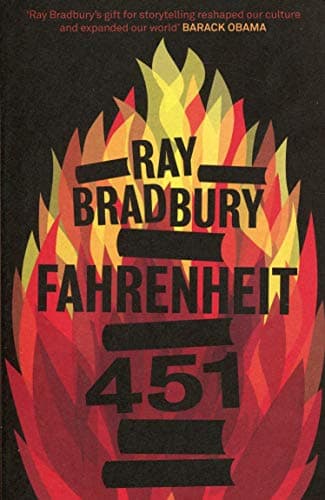
Ray Bradbury, Fahrenheit 451 (Flamingo Modern Classics)
Value For Money
Ray Bradbury, Fahrenheit 451 (Flamingo Modern Classics)
When you purchase through links on our site, we may earn an affiliate commission. Here's how it works.

User Reviews
Value For Money
Ray Bradbury's Output Of Prose Was Nothing Short O
Ray Bradbury's output of prose was nothing short of phenomenal during a writing career spanning decades. Indeed Fahrenheit 451 is well over half a century in print. Despite the volume however, this example of his work remains in many eyes as probably his best work. It deserves both that credit, and also that of being one of the best of its genre, from any age.
You're likely to notice some of that in the style of the prose, where the author, while at the time in his 20's, is casting his mind forward into a bleak, dystopian future, where behavioural traits of the main characters are styled to appear odd, different, changed, submissive, subordinate. In fact the wife character, portrayed as a largely wan, listless two-dimensional object throughout, is meant to embody the cultural and psychological profile of people at the time. This is done brilliantly, and the grey existence of a life is only kept going by the automatic arrival of two apathetic paramedics, as if it's just another life to fix.
The dumbing down of the people against a backdrop of uber-controlling all-seeing governments is the landscape of Bradbury's novel, in which the hero is - in this cultures terms - an anti-hero, a confused malcontent and, inevitably, a fugitive. It could be argued that the governmental power portrayed might take on a rather simplistic (more akin to the 30's dictatorships than 21st century laissez-faire) view. Even Bradbury could not predict the 'power of the corporation', perhaps.
But beyond that, what makes this such a stirring story is the prophetic nature of the book, the very realistic portrayal of some aspects of this new culture Bradbury creates, and the parallels one can draw with today's very consumerist, soulless, thoughtless society. The "fireman" concept is a wondrous pun [451 degrees Fahrenheit being the temperature at which books burst into flame, apparently -- you learn something new every day!] and brings the whole idea to life, and allowing Bradbury's other ideas (the Malthusian treatment of the population, the de-facto whistle-blower cultural value, obsession towards TV, even integrated wall/tv units!) to flourish, ominously close to 21st century reality - their proximity dictated perhaps most by one's own level of cynicism towards modern living.
Given this is all achieved in a couple of hundred pages, it remains a remarkable triumph of imagination, prophecy and even precis. Bradbury himself confessed this was 5 or 6 short stories effectively bolted together, at least at the outset - a real skill at taking these and bringing a novel to life from it.
Clearly, this sits alongside Orwell as seminal text of its kind. It might not have the richness of Burgess's 'Wanting Seed', nor perhaps as much Orwellian darkness, but the brevity and characterizations make it equally terrifying as a future world, and equally worrying as a comparison with the one in which we live today. Other Sci-Fi books have taken many of the same basic ideas forward as the backdrop of their own revised version of society. You can see Bradbury in a lot of more modern works, starting as early perhaps as Asimov, running through the very heart of creative media, through to ideas as recent as The Truman Show; which is perhaps the highest compliment for his work that Bradbury could receive.
I frankly expected this to be a great book, and it certainly met, and I believe exceeded, these high expectations.
So all in all, yes, quite good really (smile).
Thanks Bertie - appreciate the comment. This truly is a must-read book.
I read the book in the late 50s degbert, and found it excellent--just like your review.
Value For Money
'books Ought To Have A Happy Ending!' Did
'Books ought to have a happy ending!'
Did you notice that nowadays writers and filmmakers tend to make no difference between Horror and Science Fiction? 'Alien' is not SF but Horror, a very good horror movie but not SF. Real Science Fiction plays not only in the future but also in a society different from ours and with people who have habits and a mentality which are also different. Fahrenheit 451 is a very good example of that. Fahrenheit 451 is the temperature that makes books burn and this is the problem we're dealing with (and no longer in the far future I'm afraid). Guy Montag is the hero of the novel. He's a fireman who burns books that are in peoples houses, usually because someone denounced them at the police. It's forbidden to read books because they make you think and therefore make you unhappy (clothes have only zippers and no buttons; buttons take to much time so you start thinking and again this makes you unhappy). But Montag is a lonely person who has no contact with his wife; She only watches TV from dawn till dusk. The irony is that all the measures taken by the government to protect people from being unhappy only make them more unhappy than before.
As the story unfolds Guy Montag starts wondering what books are all about and he starts meeting people who read books (without notifying his superiors). The novel ends in a peculiar way.
A psychologist I know once said that all books ought to have a happy ending. I never asked her what would become of books without a happy ending because I'm afraid what she might answer.
Q&A
There are no questions yet.